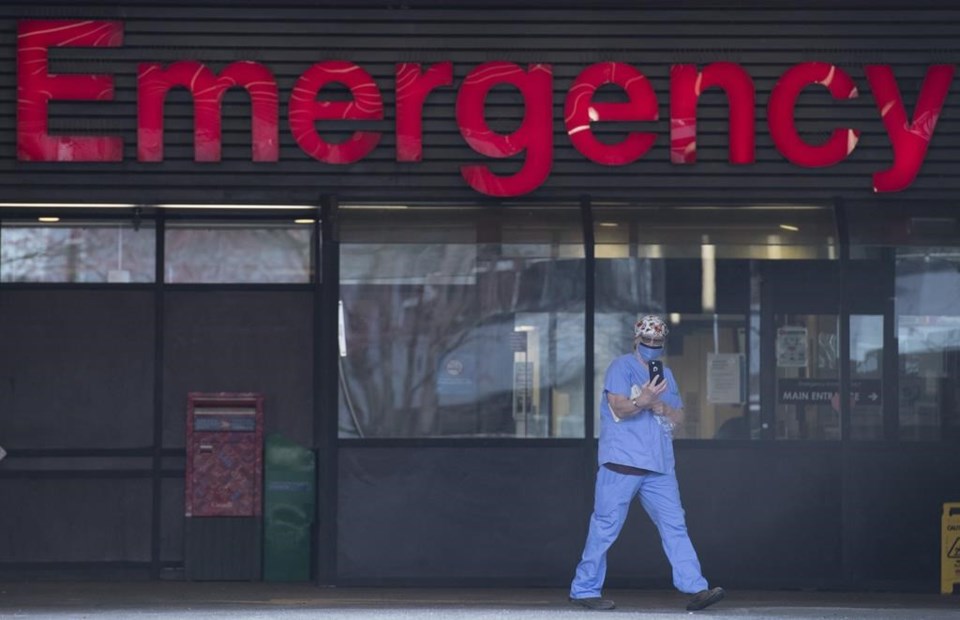A southwestern Ontario hospital grappling with record-high COVID-19 admissions was cancelling surgeries and transferring patients to other facilities this week while another scrapped procedures to free up staff who could care for the gravely ill.
The capacity crunch due to rising cases of the novel coronavirus had the head of a group representing Ontario's hospitals warning that the acute-care system is more stretched than ever and the situation could get worse.
The Windsor Regional Hospital cancelled all non-urgent, elective surgeries indefinitely and is preparing to send patients to hospitals near and far, hospital CEO David Musyj said Wednesday.
Some acute-care patients are being transferred to the hospital in nearby Chatham-Kent, Ont., he said, while those with higher needs are being transferred to London, Ont.
"We have to plan for the worst, and be ready for it. And that's why we're doing what we're doing now ... If you wait for it to come, it's too late," Musyj said.
Windsor has seen "weeks and weeks and weeks" of remarkably high COVID-19 cases per capita, he said, so he and his colleagues are preparing for a grim reality.
"It's inevitable: they're going to become hospitalized, and then critical care, and then death," he said.
The Windsor Regional Hospital said more people are hospitalized with COVID-19 at its facility than at any other point in the pandemic. A surge in deaths has meant that the facility's morgue is at capacity and the hospital is using a trailer unit to temporarily store bodies.
As of Monday, 74 patients were COVID-19 positive at the Windsor hospital, compared with the previous high of 27 during the first wave of infections in May, it said.
The hospital in Chatham-Kent was also preparing for an influx of COVID-19 patients by cancelling procedures, even as it braced for transfers from Windsor.
The Chatham-Kent Health Alliance said the "difficult decision" will take effect on Thursday, with exceptions for cancer surgeries.
The hospital said its intensive care unit was at 100 per cent capacity and overall occupancy was at 92 per cent capacity as of Tuesday.
CEO Lori Marshall shared the news in a Twitter post Tuesday, writing that surgery staff skilled with ventilators would be redeployed for the "foreseeable future."
"Simply put, our ICU is full," Marshall said in her post. "Patients will hear from their surgeons' offices. I’m sorry."
Toronto, too, has seen a worrying rise in hospitalizations, said Dr. Eileen de Villa, the city's medical officer of health.
There's been a 14 per cent increase in cases in hospital over the past month, and a 57 per cent increase since early November, she told a news conference Wednesday.
Further, she said, 87 per cent of ICU beds in the city are now occupied, as are 89 per cent of acute care beds.
"It's really very concerning when you have the opportunity to speak with the health-care workers who are in hospital," de Villa said. "They are noticing that they're getting more and more by way of COVID-19 cases, and they note as well that it is — relative to what we had in the spring — definitely a younger population."
The issue isn't isolated to the COVID-19 hot spots, the head of the Ontario Hospitals Association warned.
"Unfortunately, all the indicators still are heading in the wrong direction," said Anthony Dale. "In some cases, they're accelerating, so the situation is actually getting much worse."
As of Wednesday morning, the province was reporting 1,463 patients hospitalized with COVID-19, including 361 patients in ICU — 246 of whom are on ventilators.
While bed space is a key factor, the bigger problem is staffing, Dale said. Critical care — simply keeping a desperately ill patient alive — requires an inordinate degree of specialization.
People requiring intensive care due to COVID-19 are in addition to those in need of such care for any number of disease and trauma reasons, Dale said.
"You just have the same number of people really caring for an exploding number of patients," he said.
Dale said he preferred not to describe the situation as being on the verge of "collapse" or "out of capacity," saying the issue is with the quality of care the limited number of specialists can provide.
"What you get are conditions that are totally inappropriate to provide high quality care," he said.
- with files from Colin Perkel and Holly McKenzie-Sutter in Toronto.
This report by The Canadian Press was first published Jan. 6, 2021.
Nicole Thompson, The Canadian Press

